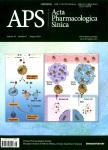Anti-epitope antibody, a novel site-directed antibody against human acetylcholinesterase
Anti-epitope antibody, a novel site-directed antibody against human acetylcholinesterase作者机构:Institute of Pharmacology and Toxicology Academy of Military Medical Sciences
出 版 物:《Acta Pharmacologica Sinica》 (中国药理学报(英文版))
年 卷 期:2004年第25卷第4期
页 面:33-37页
核心收录:
学科分类:1001[医学-基础医学(可授医学、理学学位)] 100102[医学-免疫学] 10[医学]
基 金:Project supported by the “9th Five-Year” Military Medicine Health Science Foundation (No 96Z017)
主 题:acetylcholinesterase butyrylcholinesterase epitopes antibodies enzyme-linked immunosorbent assay Western blotting
摘 要:AIM: To construct synthetic antigens using the epitope of human brain acetylcholinesterase (hbAChE) for induc- tion and detection of the specific antibody against the epitope, and to analyse the immunogenicity of the antibody. METHODS: The epitope (RTVLVSMNYR, amino acids 143-152) of hbAChEwas chemically synthesized, coupled with the carrier protein keyhole limpet hemocyanin (KLH) to construct an artificial immunogen (KLH-epitope), and injected into rabbits to raise antibody. The epitope conjugated with bovine serum albumin (BSA) was used as the detection antigen. The specificity of the antibody was tested by enzyme-linked immunosorbent assay (ELISA) and Western blotting. The immunoreaction between the anti-recombinant human butyrylcholinesterase (rhBChE) polyclonal antibody and the biotinylated-epitope was examined by indirect ELISA. RESULTS: The erythrocyte AChE, the hbAChE, rhBChE and the BSA-epitope all immunoreacted with the anti-epitope antibody against the epitope (143-152) of hbAChE, whereas the torpedo AChE did not. CONCLUSION: The hbAChE, the human erythrocyte AChE and hBChE share the conservative antigenic epitope RTVLVSMNYR, hence they can all immunoreact with the anti-epitope antibody. Since the epitope of hbAChE is less similar with the aligned amino acid sequences of AChE of Torpedo californica or Torpedo marmorata, there is not any immunoreactivity between them. The R, M, and N residues in the epitope seem to be necessary radicals for the conservation of antigenicity.



